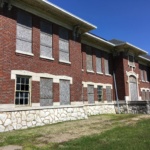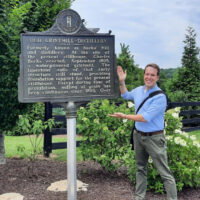WKMS presents The Reckoning, a new series of public radio specials that trace the history and lasting impact of slavery in America by looking at how the institution unfolded in Kentucky. The four-part series begins Wednesday, September 30th.
Over the past several months, Louisville, Kentucky, has emerged as what The Washington Post called “the epicenter of the national movement for racial justice.” The killing of Breonna Taylor by Louisville police set off months of nightly protests that put the city, and the state of Kentucky, into the spotlight worldwide.
“The Reckoning: Facing the Legacy of Slavery,” a new series from WKMS that began on Sept. 30, traces the history and lasting impact of slavery and Jim Crow oppression in Kentucky, exploring many of the issues that have exploded into public consciousness throughout the country in 2020.
Kentucky stayed in the Union during the Civil War, seemingly on the right side of the battle over slavery, but the truth is far more complex. Many Kentuckians fought to hang onto slavery and the wealth their slaves provided. In the years that followed, white citizens campaigned to downplay slavery’s role in the state’s economy and culture while working to deny black citizens a seat at the table.
As part of this story, we will meet members of two families deeply affected by the institution of slavery. One is a prominent white family descended from both a major slave trader and one of Kentucky’s largest slave owners, the other an African American family who descend from two of the people enslaved by the white family. These families reflect how slavery touched nearly every person, place, and institution in America, and how the country still needs to reconcile this painful past with the impact slavery has had on the present-day health, wealth, and safety of African Americans.
The producer and host of the series is Dan Gediman, who has been producing award-winning programming for public radio for over 35 years, including the NPR series “This I Believe,” the Audible documentary series The Home Front: Life in America During World War II, and 50 Years After 14 August, which won the duPont-Columbia award, one of the highest honors in broadcasting.
Loretta Williams is a Peabody award-winning report, producer, and editor who works on stories that delve into America’s cultural divides. She is the editor for “The Reckoning” and brings the perspective of a descendent of those who were enslaved.
Listen
Listen to “The Reckoning: Facing the Legacy of Slavery” in Kentucky on-air on online at WKMS.org. For more information on the series and its hosts, visit reckoningradio.org.
EPISODE ONE: Hidden History
The history of slavery is often taught as a bitter chapter of America’s past that has been rectified. But in Kentucky, that history has been rarely acknowledged and is poorly documented. This has made it particularly difficult for African American families to learn anything about their enslaved ancestors. We’ll meet one Black family just beginning to learn about their family’s connections to a plantation in Louisville.
EPISODE TWO: Sold Down the River
Kentucky was an important hub of America’s internal slave trade, with fortunes made by slave traders and those who invested in enslaved people as commodities. We hear from members of a white family that descend from a Louisville slave trader and learn how integral slavery was to their wealth and to the economy of the state of Kentucky.
EPISODE THREE: Aftermath
Wednesday, Oct. 14, at 7 p.m. and Wednesday, Oct. 21, at noon
Kentuckians fought on both sides of the Civil War but came together at war’s end to oppose a common foe — newly emancipated African Americans yearning for education, dignity, and a decent living. In the years that followed, Kentucky pioneered restrictive racial laws that became models for the rest of the South and thwarted many efforts by Black Kentuckians to prosper — using violence and terror to accomplish whatever the law could not.
EPISODE FOUR: Facing the Past
Later this year — stay tuned for more updates following the 2020 election.
There are clear lines that connect the legacy of slavery to many of our present-day issues, including the racial inequities of COVID-19 infection and deaths, wealth inequality, and ongoing police brutality. A true and deep understanding of our history allows us to navigate the present moment and stop running away from the past.






